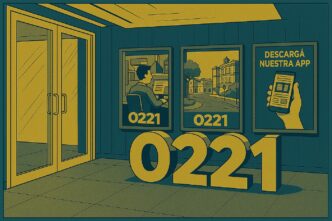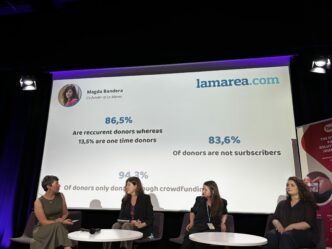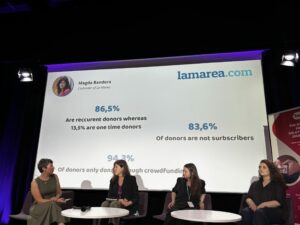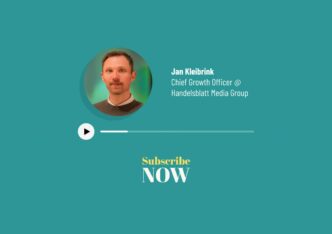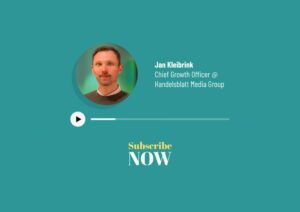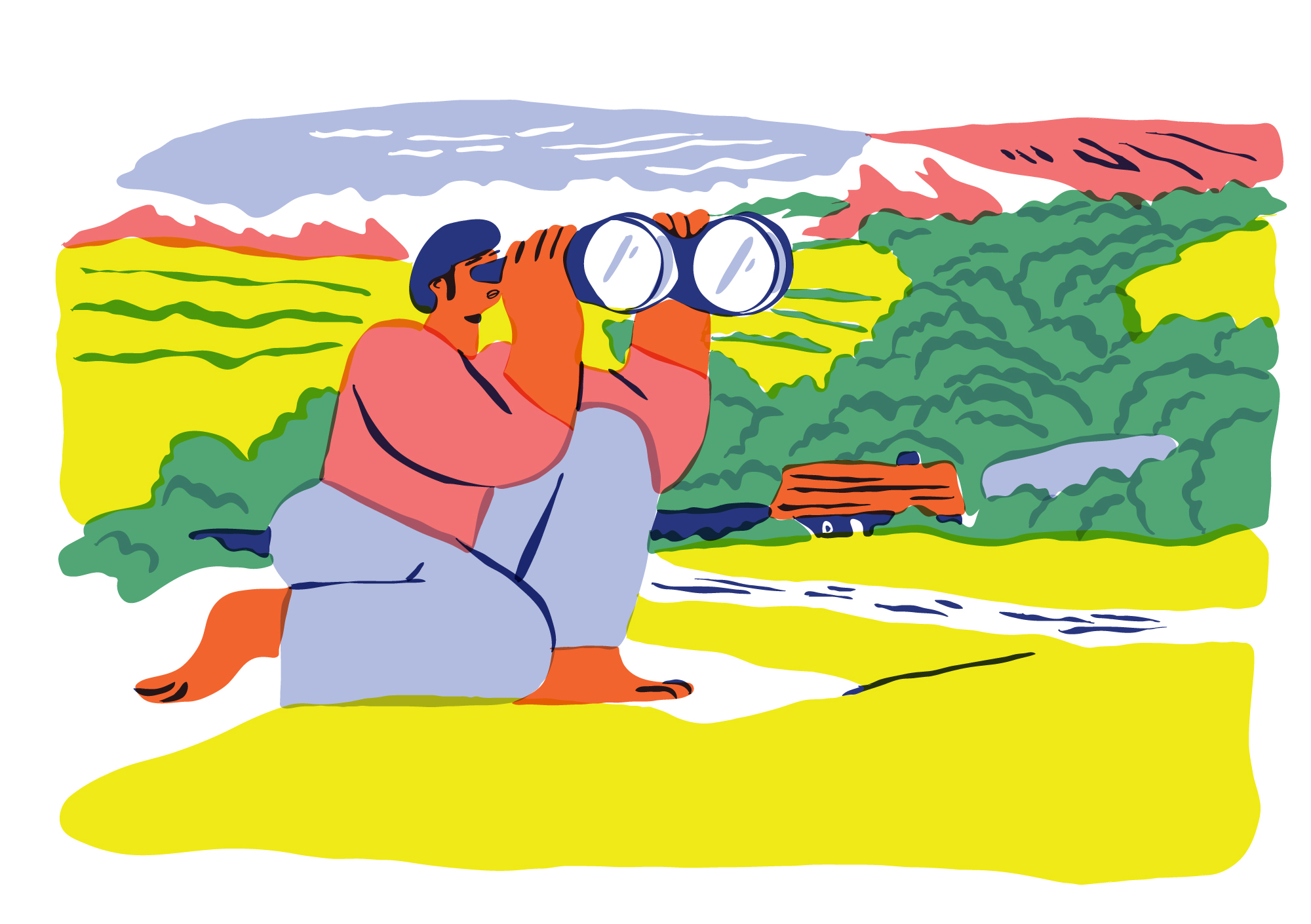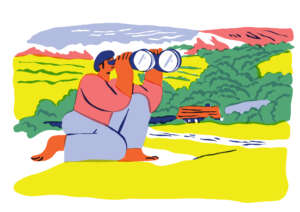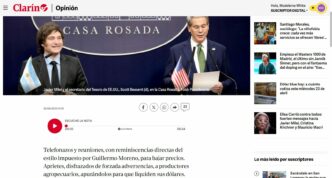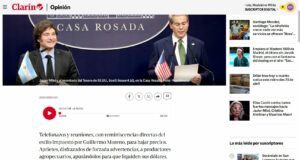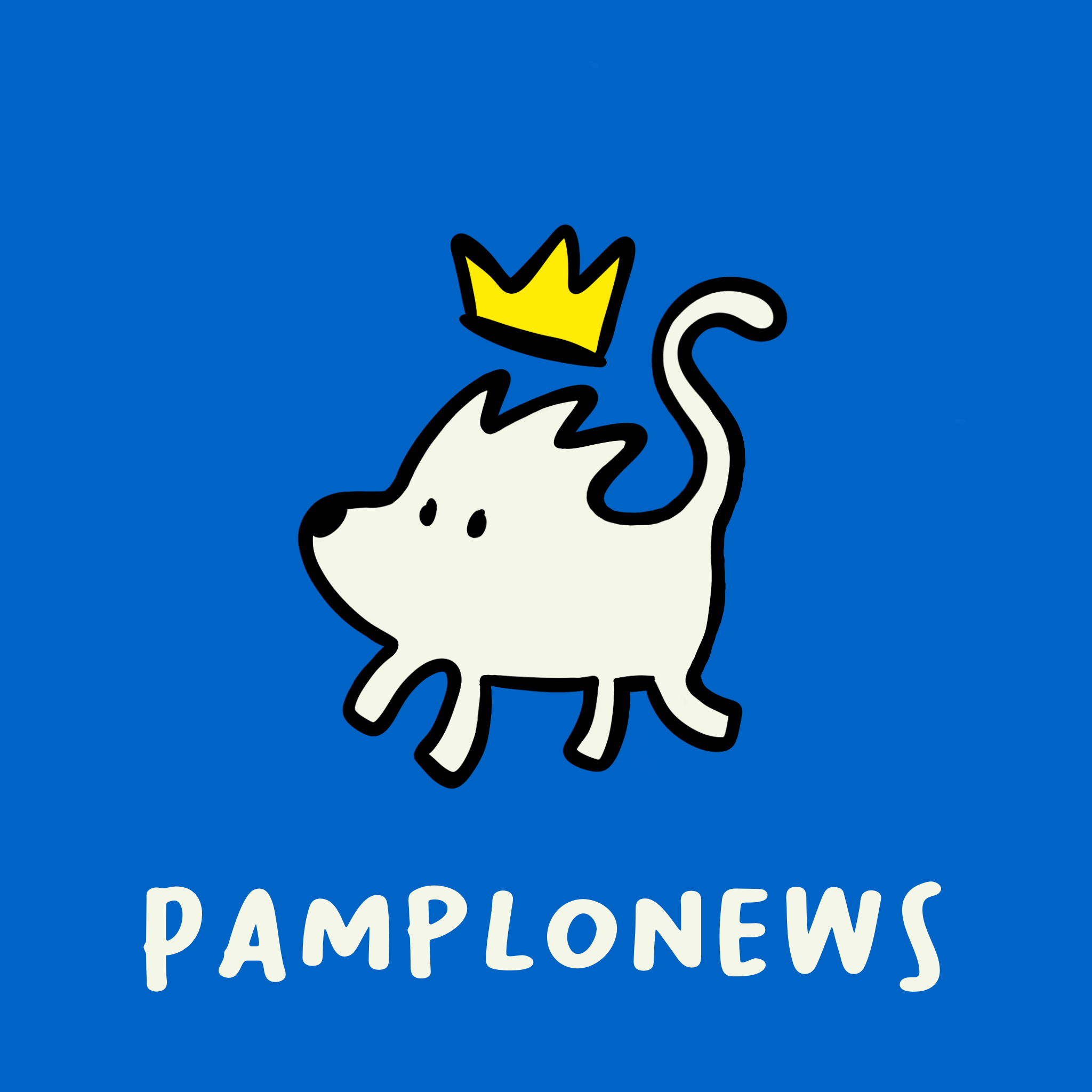

We recently had the pleasure of speaking to Juan Andrés Muñoz, ex-managing director at CNN, who shared his story of Pamplonews, the WhatsApp-based media that he founded earlier this year alongside Diego Macaya. After just a few months in business, and a subscriber base that has already reached the 3,000 mark, this innovative, hyper-local news format is taking the Spanish town of Pamplona by storm, and there’s certainly a lot to learn from their model!
What is Pamplonews and how did you come up with this concept?

Pamplonews is a fresh take on news delivery, centered on local insights that truly matter.
Our mission is simple – serve our users with news that isn’t just informative but also personally useful. Together with my co-founder, Diego Macaya, we’re shaping local news to be what we’d want as locals ourselves.
Our approach is straightforward—curating the most intriguing events, experiences, food recommendations, courses, practical tips, etc, all presented in a style that’s easygoing, engaging, surprising, and approachable. We keep it concise and punchy, even throwing in some emojis and bullet points to make reading and sharing a breeze. Links aren’t about clickbait; they’re shortcuts to real experiences and events we’re passionate about.
At Pamplonews, our goal is to bring together the widest possible audience. Unlike traditional media that often falls into political divides, we’re all about focusing solely on topics that unite. We believe in community, shared experiences, and stories that resonate with everyone, regardless of differences. Our aim is to create a space where diverse voices can come together and celebrate what connects us, making Pamplonews a place where people from all walks of life can find something that speaks to them.
The journey that led me here has been like Steve Jobs’ metaphorical dots connecting. Our guiding philosophy, “Assertive Journalism,” (sort of an acronym for Anticipation, SERvice and interacTIVE) took shape during my time at CNN working along with my colleague and friend Alvaro Valderrama. This framework is about anticipating needs, serving users, and fostering interaction. We want to offer content that’s ahead of the curve, tailor-made for our audience’s needs. Without utility, a product is empty. Engaging our audience isn’t just about feedback; it’s co-creating content with them.
My path was also shaped by insights from industry reports like the Reuters Digital News Report. It became clear that news consumption was changing, and people wanted content that improved their lives. Traditional media often lagged in adapting to this shift.
My failed application for the JSK Fellowship at Stanford marked another pivotal point. Focusing on “Eradicating News Deserts and Strengthening Local News” made me dive deep into local news and technology’s potential. The results revealed a gap in genuinely serving local audiences. I did not get the fellowship but learned a ton in the process.
Finally, inspiration came from two unique sources. Documented, a New York-based newsroom, who used WhatsApp for content sharing within immigrant communities. Conversations with their Director of Audience & Community, Nicolas Rios, broadened my perspective and inspired me a lot. The Geekout WhatsApp experiment by Matt Navarra also caught my attention—showcasing a community-driven approach to content sharing and a smart monetization approach. Chatting with Matt offered valuable insights into innovative content delivery.
Drawing on my background in Human-Computer Interaction, I’ve always been passionate about crafting products that are intuitive and enjoyable to use. This perspective has played a key role in shaping Pamplonews. I believe that technology should seamlessly connect people to valuable content, making it accessible and meaningful. With this approach, I’ve infused my training into the design of Pamplonews, ensuring that the interaction is simple and engaging. It’s all about creating a user-friendly experience that resonates with our community in Pamplona.
How are you different from other local news outlets in the area?
Pamplonews is all about Pamplona and its community, offering localized information and topics in a unique style. Unlike traditional local media, which often cover a broad range of subjects and areas, we focus on a distinct agenda. While other outlets may churn out the same mix of stories, including local, national, politics, crime, entertainment, sports, weather, and business, we steer clear of that terrain. Our approach revolves around serving up news that’s useful, events, and lifestyle content—stuff that enhances our users’ experience of the city and lets them squeeze out all the enjoyment.
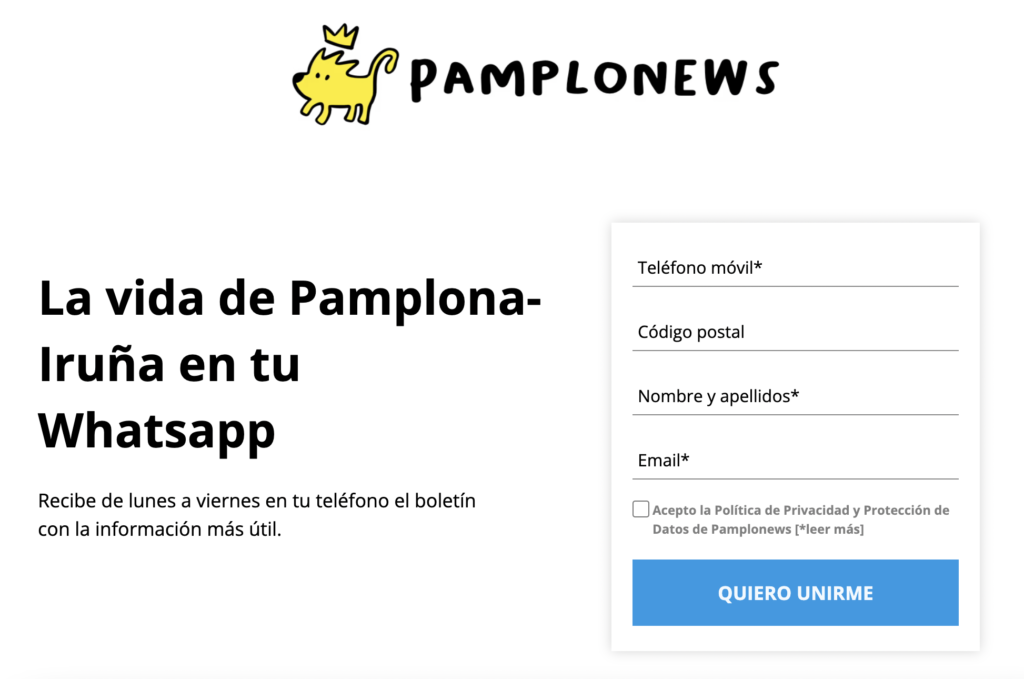
Our style sets us apart. It’s more casual, direct, and simple—akin to how friends message each other. We sidestep traditional news articles format, opting for bullet points and concise content units that provide the right amount of info, a touch of wit, and useful links to original sources.
What really sets us in a league of our own is our exclusive use of WhatsApp as a delivery channel. Unlike our competitors who have full-blown websites and direct their messaging products towards driving website traffic, we’re all about the mobile messaging experience. I like to paraphrase McLuhan saying that in Pamplonews, “The message is the Medium”.
Being small allows us to cultivate a personal rapport with our readers. We engage with them, gather insights through surveys and direct messages, and Whatsapp is the ideal platform for fostering this interactive connection.
Embracing our youthful, experimental nature, we don’t shy away from daily experiments, unafraid of challenging the status quo. We’re agile, preferring quick-and-dirty approaches to gather insights.
Mistakes? We see them as information to get better.
Adaptability is another ace up our sleeve. We can swiftly pivot our content and focus based on shifting audience preferences. Unlike traditional media with more rigid structures, our nimbleness is a distinct advantage.
When it comes to monetization, we’re thinking outside the box. From local offers to events and collaborations, we’re exploring a range of revenue streams. Unlike traditional local media that often leans on conventional advertising and subscriptions, we’re forging innovative pathways.
Last but not least, community engagement is our secret sauce.
We’re all about involving the local community, experts, and leaders through collaborations and user-generated content. This sets us apart from traditional media’s narrower approach.
Why WhatsApp? How has this format proved valuable for reader acquisition and engagement?
For numerous years, the concept of developing WhatsApp-based products had been percolating in my mind. The pervasive reach of this messaging platform across Latin America and Spain were a constant source of inspiration. However, the journey was often deterred by the technical limitations inherent to the platform, hindering the seamless creation of news products. Unlike platforms such as Telegram, which boasts an array of publisher-friendly features, WhatsApp demanded administrators to invest significant manual effort in community management. Yet, Telegram lacked the scale and penetration wielded by WhatsApp.
Immersing myself in a trove of news consumption reports spanning recent years, unveiled a persistent trend: WhatsApp consistently stood out as a growing platform for news consumption. This revelation led me to embark on this venture and introduce our product.
Pamplonews leverages WhatsApp’s Communities. This product offers valuable features, including a notably augmented maximum membership limit and the crucial ability to hide user numbers, thereby safeguarding our users’ privacy. Furthermore, the seamlessness of sharing the community link and joining the community itself has remarkably streamlined the user acquisition process. This has removed any technological barriers and frictions for users, regardless of age; joining the community is an intuitive process, universally understood.
Add to this the fact that virtually every smartphone owner in Pamplona (and Spain) is equipped with WhatsApp—an app that commands ubiquitous presence in our target market. The connection we share with our users is characterized by its directness; a mere WhatsApp message serves as the sole divide between us and each individual.
The proximity this affords is unparalleled—always just a message away.
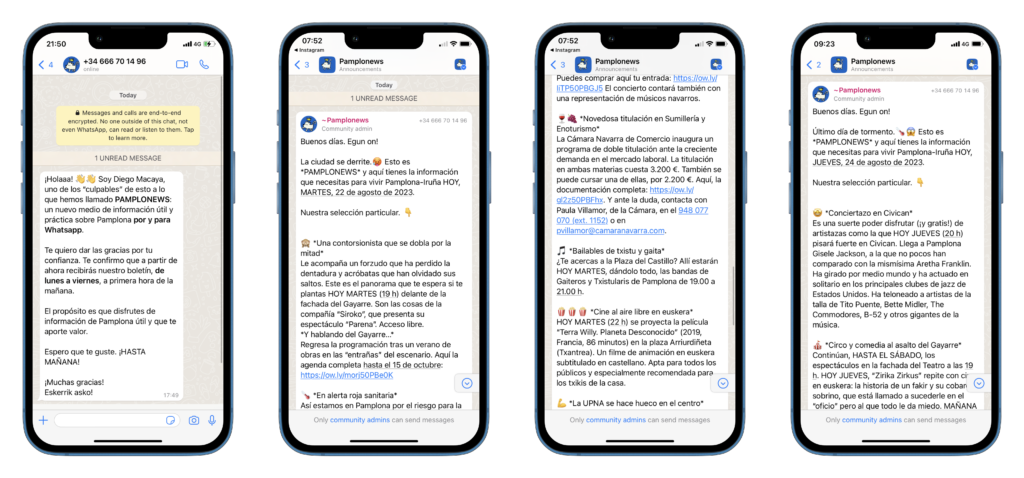
You only launched on June 6th – What has been the response so far? How many readers do you have?
The response has been amazing. Despite entering a market already dominated by established newspapers and digital outlets, we’ve managed to carve out a space for ourselves. In just two months, we’ve gathered 3,750 subscribers, with the number of new subscribers tripling from July to August.
This is even more impressive considering that July and August are typically slow months for news consumption in Spain, especially in Pamplona due to summer vacations and the attention-grabbing Running of the Bulls Festival in July. Despite these challenges, our growth has exceeded our expectations.
What are your KPIs? How do you know if a story / message has been popular amongst readers?
In our current phase, characterized by the recent launch of our product and the utilization of WhatsApp as our primary distribution channel, the available data remains somewhat limited. Our focus primarily revolves around two key metrics: the number of subscribers, an index we diligently track on a daily basis, and the count of Unsubscribes, a parameter we also monitor.
I am delighted to say that our rate of unsubscribers currently stands at an admirably minimal level. On a daily basis, the unsubscribe count remains modest, just a handful, and notably, most of these instances can be attributed to reasons that extend beyond the product’s quality or user satisfaction.
This churn frequently stems from human error or apprehension derived from distrust to joining unknown WhatsApp groups. In these instances, we proactively reach out to each individual who unsubscribes in order to understand the specific reasons.
These interactions, although labor intensive, have proven enlightening for us, and reassuring for our users, who in most cases rejoin the community. There’s an inherent allure in being heard and feeling valued within a product environment that prizes engagement and meaningful interactions over sheer numerical metrics. It is this shared sentiment that resonates deeply within our user community.
How do you monetize your content?
We’re excited about the various opportunities ahead to monetize our content and keep providing value to our local community. While we’re not monetizing right now, we’re charting an exciting path to generate revenue and make Pamplonews sustainable in the long run.
Our vision involves a mix of innovative approaches. We’re looking into partnering with local advertisers, giving them a meaningful way to connect with our audience. Also, we’re planning to offer exclusive deals and discounts from local businesses, benefiting both our subscribers and collaborating establishments.
Monetization will also take shape through unique and engaging events that resonate with our community’s interests and values. We’re looking forward to organizing local events that provide not just knowledge, learning, and entertainment, but also encourage connection and participation from our subscribers.
Another exciting avenue is setting up an e-commerce platform offering local products and services, creating a shopping experience and supporting local entrepreneurs. We’re also planning to team up with local institutions and organizations for collaborations that align with their goals and values, further enriching our readers’ experience.
Our aim is to build a monetization model that reflects our commitment to the Pamplona community and offers genuine value to all our users. Each step we take will be carefully considered to ensure we keep delivering valuable content and creating sustainable opportunities for the community we deeply care about.
What do you have in mind for the future of Pamplonews?
Our immediate focus is on growing our subscriber base and exploring ways to generate revenue. This is crucial as we want to make sure that our product not only attracts an audience but also sustains itself financially. Our next step involves creating a premium offering that could potentially lead to a subscription model. We have plenty of ideas for valuable premium content, but our priority right now is demonstrating our ability to monetize our current audience.
Looking ahead, we have some exciting plans in the pipeline. We’re considering the use of AI to develop new voice-based products and also venturing into producing video content. Additionally, we’re exploring opportunities in e-commerce.
However, it’s important to recognize that these plans will take time to fully materialize. Our approach is grounded in practicality and a measured pace of implementation.
If everything develops as planned, the next step would be expanding this concept to other major cities in Spain to replicate the model.
One last point I wanted to mention is that, inspired by the “Software as a Service” model, Pamplonews will embrace a concept I call “News as Service” (NAS). Just as software is no longer a product you buy and own but a continuous service that evolves and adapts, I see news and information as an ongoing service to our community. Our aim is to go beyond the traditional news consumption model by offering a dynamic platform that provides value in real-time. Pamplonews will act as a service hub, delivering timely, relevant, and engaging content that actively serves the interests and needs of our readers. It’s a shift from passive news consumption to an interactive and personalized experience, where information becomes a utility that empowers our users right here in Pamplona.
> Subscribe for free to Pamplonews’ WhatsApp group here.

